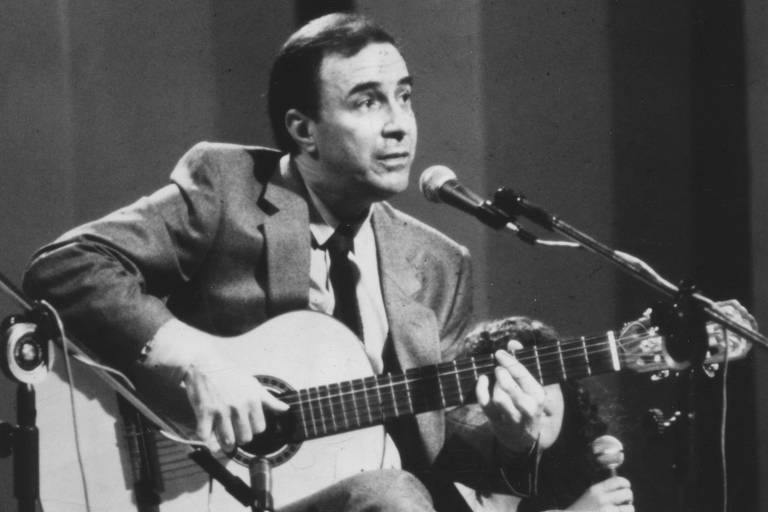Adeus, João Gilberto; the world weeps for him
The death of the singer João Gilberto leaves an irreplaceable gap in the genre and Brazilian music. Gilberto died ill, alone, and in ruin.

The Brazilian João Gilberto, who died at the age of 88, was the last living father of bossa nova, the syncopated rhythm of samba, but mixed with the freshness of jazz that became a reflection of the Brazilian soul. His delicate voice singing Garota de Ipanema (The Girl from Ipanema) continues to captivate the world more than 60 years after its recording. In the summer of 1958, he spread Saudade (nostalgia) alongside pianist-composer Tom Jobim and poet-diplomat Vinícius de Moraes. But Gilberto died ill, alone and in ruin.
Most Brazilians last saw him in a video in 2015, in which he appeared, very thin and in pajamas, singing the endearing song to his granddaughter, accompanied by the guitar. Born on June 10, 1931, in Juazeiro, in the state of Bahia, João Gilberto Prado Pereira de Oliveira discovered music with his first guitar, at the age of 14. Four years later, Joãozinho left his hometown to go to Salvador de Bahia, where he was heard on local radio, and at age 19 he went to Rio de Janeiro. There he played in a small band, Garotos da Lua, with which he made his first recordings, and in 1957 he became known as a guitarist on an album by Elizeth Cardoso, Canção do Amor Demais, composed by Tom Jobim and Vinícius de Moraes.
Chega de saudade
It was on July 10, 1958, shortly after Brazil won their first World Cup title in Sweden when João Gilberto entered the Odeon studio to record a song that, according to historians, became a framework for Brazilian culture and music. The recording of the 78 rpm vinyl of a compact that included, on the one hand, Chega de Saudade, samba composed by Antonio Carlos Jobim and the poet and diplomat Vinícius de Moraes, and on the other Bim Bom, is considered the initial frame of the bossa nova because it allowed the genre, which until then was known in a few night houses in Rio de Janeiro, to be taken all over Brazil and the world. The audience was enchanted by his whispering voice, Jobim's harmonies, and Moraes' words.
In 1960 and 1961 he released two more albums, with compositions by Jobim and Moraes, along with other references. Then, for almost 20 years the guitarist and singer lived in New York with a two-year interlude in Mexico. He worked with Jobim and jazz musicians such as saxophonist Stan Getz. The album Getz/Gilberto, with Garota de Ipanema sung by Astrud Gilberto, his first wife (who left him for Getz), was a hit, as was his concert at New York's Carnegie Hall in 1964. In 1967, Frank Sinatra included Girl from Ipanema in his repertoire, and the bossa nova captivated an international audience.
Gilberto continued to garner praise in 1970 with his new album, Ela é Carioca. And although loyal to Jobim, he also joined Caetano Veloso and Maria Bethania, mixing bossa nova and samba, between songs and dialogues. Gilberto returned to Rio, but continued to climb the most important stages in the world, delighting the public with pieces such as Desafinado, Garota de Ipanema, Chega de Saudade, Rosa Morena, Corcovado, and Aquarela do Brasil. In 2000, he won the Grammy for Best World Music Artist for his album João: Voz e Violao. His success doesn't end there: in August 2008, tickets for is concerts for the 50th anniversary of the bossa nova sold out in less than an hour. And in 2015 it was presented at the festivals of Vienna, Marcillac, and Marseille.
The plot of his last days
But his last days were less happy. Gilberto had been left in the middle of a fight between his older sons, João Marcelo and Bebel Gilberto, also musicians, with his last ex-wife Claudia Faissol, a journalist 40 years younger than him and mother of his teenage daughter. Bebel and João Marcelo accuse Faissol of taking advantage of the musician, but the plot transcended money. Many have defined the artist as a genius of obsessive perfectionism, as he exposed in his remembered performances of Desafinado, Corcovado, or Chega de Saudade, often in duet with his first wife Astrud Gilberto.
However, Gilberto was equally famous for his eccentricities, such as his seclusion in pajamas at home or his social phobia, whereby he would barely open the door to receive daily food from a restaurant. Since the end of 2017, the international referent of Brazilian music had been under the tutelage of his daughter Bebel, who assured that her father could no longer take care of his health and finances due to his physical and mental fragility. Bebel endorsed a search of the apartment whose rent Gilberto had not paid for months in the Leblon neighborhood. The singer was forced to leave the building and moved to a borrowed apartment in Gávea.
The decline had begun in 2011 when Gilberto had committed to a concert tour for his 80 years but suspended it alleging health problems. The singer had received a million reais (then about 600 thousand dollars) as an advance and was forced to return them. Amid a lengthy lawsuit with his first label, without new albums since 1989 and presentations since 2008, he sold 60% of the rights over his first four albums to the Opportunity bank in 2013.
One of the latest news about the composer was this year when the Rio de Janeiro court issued a ruling favorable to the singer and determined that Universal would pay the guitarist the royalties for the sale of records that he owed him since 1964, as well as a payment for moral damages. João Gilberto left 13 studio albums and four studio albums: "It's all there. The man behind these wonders did not need to appear "at the concerts, said yesterday Ruy Castro, author of the book on bossa nova Chega de Saudade, in an article published by the Folha de Sao Paulo newspaper.




